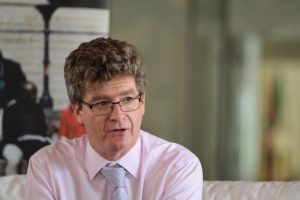Immense potential for Guyana’s leaders to reconcile – British High Commissioner
British High Commissioner, Greg Quinn, sees immense potential for reconciliation amongst Guyana’s political leaders, following a very contentious, protracted electoral process.
Along with constitutional reform, he said…“we need reconciliation and to do that, we need political leadership and political leadership that is willing to pull supporters down a road of compromise for the benefit of all. Nobody, no member of society should feel persecuted. Everyone must be seen to benefit.”
Quinn participated in a recent panel discussion with the United Kingdom’s Canning House, a forum for discourse on Latin American issues.
During the discussion, the diplomat noted how Guyana’s electoral process continues to be contested and challenged. It has been marred by court challenges, misinformation, and several attempts to rig the results in favour of the APNU+AFC Coalition.
“The ongoing uncertainty has not been helpful,” Quinn said. “It has stoked division and there continues to be division in this country.”
“The upshot of this controversial election is that whoever wins or is declared the winner will need to show quickly that there is room for every citizen and is willing to support with constitutional reform, some of the issues that have led to the controversies in this election process such as electoral reform.”
Both major parties have paid lip-service to the matter, but coming through on the promise is another story. APNU+AFC, for instance, had made reform of Guyana’s supreme law a feature of its 2015 elections campaign. After five years, it has not fulfilled on that promise.
Quinn has shown staunch advocacy for Constitutional reform, particularly with a view of doing away with the winner-takes-all system.
During the Canning House discussion, Quinn said, “Many of the issues around the elections result from a polarized ethnic situation and the winner takes all electoral system which in my view is no longer fit for purpose.”
He had told Kaieteur Radio in early June that that should be high on the agenda of any Government.
During the Canning House discussion, the British High Commissioner pointed to Northern Ireland, as he did in June, as having had an experience, which Guyana can learn from.
“My home, Northern Ireland which is not in any way perfect in any shape or form, is an example of how this should work.”
Northern Ireland, a part of the United Kingdom, had experienced ethno-political violent conflict for decades, coming somewhat to an end in the 1990s, mainly between those who supported Northern Ireland being part of the union with Great Britain, and Catholics who wanted to see a unified Ireland.
“We have been through a painful and a tough process,” he said, “and there is much still to be done following the Northern Island Peace Process and Agreement.”
This process constituted the events, which were seen to have significantly reduced the violence.
“Ultimately,” he said, “the Northern Ireland which I see today and which my family still lives in is unrecognizable from the country I grew up in the 1970s. And that is a good thing. I would never and I hope none of us would see a return to the bad old days in Northern Ireland.”
Quinn said that, after living in Guyana for the past five and a half years, he sees potential here for a much better future, addressing the grievances felt on both sides of the political divide.
“I think passionately about this place…I see the potential. I want to see this country get to where it should be…”






















